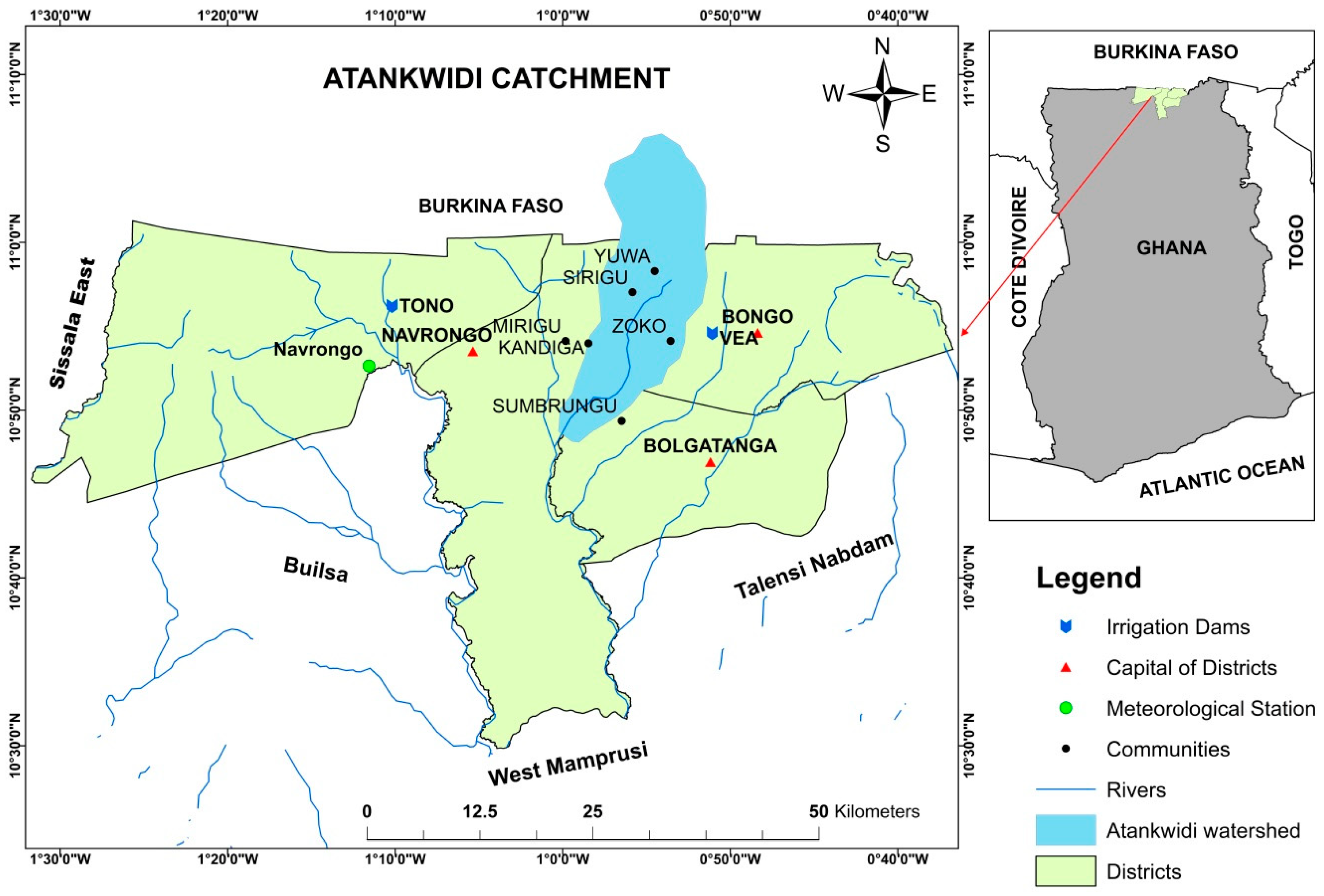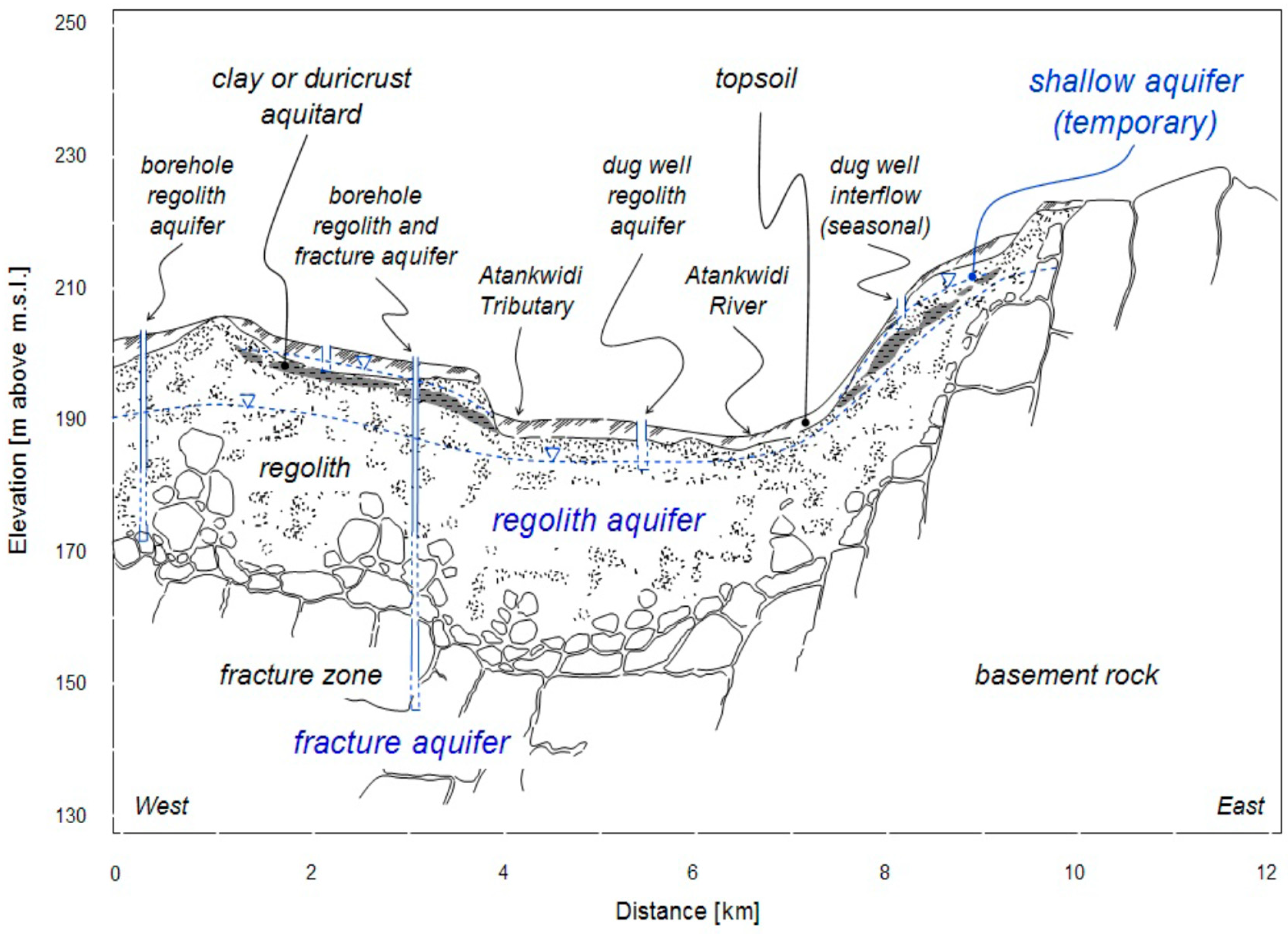Institutional Feasibility of Managed Aquifer Recharge in Northeast Ghana
Abstract
1. Introduction
2. Review of the Existing Literature
2.1. Managed Aquifer Recharge
2.2. MAR in Northern Ghana
2.3. Institutions and their Nature
3. Materials and Methods
3.1. Study Area
3.2. Data for the Study
4. Results and Discussion
4.1. Formal Government Institutions
4.1.1. Laws/Legislative Instruments
4.1.2. Policies
4.1.3. Administration
4.2. Catchment-Level Institutions
Nature of Institutions
- Taboos
- Rules
- Customs/norms/traditions
- Groundwater leaders
5. Conclusions
Author Contributions
Funding
Acknowledgments
Conflicts of Interest
References
- Stefan, C.; Ansems, N. Web-based global inventory of managed aquifer recharge applications. Sustain. Water Resour. Manag. 2018, 4, 153–162. [Google Scholar] [CrossRef]
- Page, D.; Bekele, E.; Vanderzalm, J.; Sidhu, J. Managed Aquifer Recharge (MAR) in Sustainable Urban Water Management. Water 2018, 10, 239. [Google Scholar] [CrossRef]
- Dillon, P.; Pavelic, P.; Nava, A.P.; Weiping, W. Advances in multi-stage planning and implementing managed aquifer recharge for integrated water management. Sustain. Water Resour. Manag. 2018, 4, 145–151. [Google Scholar] [CrossRef]
- Owusu, S.; Mul, M.L.; Ghansah, B.; Osei-Owusu, P.K.; Awotwe-Pratt, V.; Kadyampakeni, D. Assessing land suitability for aquifer storage and recharge in northern Ghana using remote sensing and GIS multi-criteria decision analysis technique. Model. Earth Syst. Environ. 2017, 3, 1383–1393. [Google Scholar] [CrossRef]
- International Groundwater Resources Assessment Centre (IGRAC). Artificial Recharge of Groundwater in the World, Report. Available online: https://www.un-igrac.org/sites/default/files/resources/files/2008_IGRAC_Global%20MAR%20Inventory%20Report.pdf (accessed on 10 April 2018).
- Christoff, S.P.; Sommer, M.J. Women’s Empowerment and Climate Change Adaptation in Gujarat, India: A Case-Study Analysis of the Local Impact of Transnational Advocacy Networks. Sustainability 2018, 10, 1920. [Google Scholar] [CrossRef]
- Ministry of Water Resources, Works and Housing. Riparian Buffer Zone Policy for Managing Freshwater Bodies in Ghana; Government of Ghana: Accra, Ghana, 2011.
- Barry, B.; Kortatsi, B.; Forkuor, G.; Gumma, M.K.; Namara, R.E.; Rebelo, L.-M.; van den Berg, J.; Laube, W. Shallow Groundwater in the Atankwidi Catchment of the White Volta Basin: Current Status and Future Sustainability; IWMI: Colombo, Sri Lanka, 2010; Volume 139. [Google Scholar]
- Dittoh, S.; Awuni, J.A.; Akuriba, M.A. Small pumps and the poor: A field survey in the Upper East Region of Ghana. Water Int. 2013, 38, 449–464. [Google Scholar] [CrossRef]
- Laube, W.; Schraven, B.; Awo, M. Smallholder adaptation to climate change: Dynamics and limits in Northern Ghana. Clim. Chang. 2012, 111, 753–774. [Google Scholar] [CrossRef]
- Martin, N. Development of a Water Balance for the Atankwidi Catchment, West Africa: A Case Study of Groundwater Recharge in a Semi-Arid Climate. Ph.D. Thesis, University of Goettingen, Goettingen, Germany, 2006. [Google Scholar]
- Johnston, R.M.; McCartney, M. Inventory of Water Storage Types in the Blue Nile and Volta River Basins; IWMI Working Paper 140, International Water Management Institute (IWMI): Colombo, Sri Lanka, 2010; 40p. [Google Scholar]
- Kankam-Yeboah, K.; Obuobie, E.; Amisigo, B. Climate Change Impacts on Water Resources in Ghana; Ghana National Commission for UNESCO: Accra, Ghana, 2009; pp. 65–69. [Google Scholar]
- Water Resources Commission. White Volta River Basin—Integrated Water Resources Management Plan. Available online: http://webcache.googleusercontent.com/search?q=cache:vkxrZJOB6eIJ:www.wrc-gh.org/dmsdocument/19+&cd=2&hl=en&ct=clnk&gl=de (accessed on 20 March 2016).
- Kwoyiga, L.; Stefan, C. Groundwater Development for Dry Season Irrigation in North East Ghana: The Place of Local Knowledge. Water 2018, 10, 1724. [Google Scholar] [CrossRef]
- Namara, R.E.; Horowitz, L.; Nyamadi, B.; Barry, B. Irrigation Development in Ghana: Past Experiences, Emerging Opportunities, and Future Directions; GSSP Working Papers; International Food Policy Research Institute: Accra, Ghana, 2011.
- Gale, I. Strategies for Managed Aquifer Recharge (MAR) in Semi-Arid Areas; UNESCO IHP: Pari, France, 2005. [Google Scholar]
- Asano, T.; Cotruvo, J.A. Groundwater recharge with reclaimed municipal wastewater: Health and regulatory considerations. Water Res. 2004, 38, 1941–1951. [Google Scholar] [CrossRef]
- MacDonald, A.M.; Bonsor, H.C.; Dochartaigh, B.É.Ó.; Taylor, R.G. Quantitative maps of groundwater resources in Africa. Environ. Res. Lett. 2012, 7, 024009. [Google Scholar] [CrossRef]
- Dillon, P.; Pavelic, P.; Page, D.; Beringen, H.; Ward, J. Managed aquifer recharge: An introduction. Waterlines Rep. Ser. 2009, 13, 86. [Google Scholar]
- Mechlem, K. Groundwater governance: The role of legal frameworks at the local and national level—Established practice and emerging trends. Water 2016, 8, 347. [Google Scholar] [CrossRef]
- Megdal, S.B.; Dillon, P. Policy and economics of managed aquifer recharge and water banking. Water 2015, 7, 592–598. [Google Scholar] [CrossRef]
- Dillon, P. Future management of aquifer recharge. Hydrogeol. J. 2005, 13, 313–316. [Google Scholar] [CrossRef]
- Moeck, C.; Radny, D.; Popp, A.; Brennwald, M.; Stoll, S.; Auckenthaler, A.; Berg, M.; Schirmer, M. Characterization of a managed aquifer recharge system using multiple tracers. Sci. Total Environ. 2017, 609, 701–714. [Google Scholar] [CrossRef] [PubMed]
- Bouwer, H. Artificial recharge of groundwater: Hydrogeology and engineering. Hydrogeol. J. 2002, 10, 121–142. [Google Scholar] [CrossRef]
- Greskowiak, J.; Prommer, H.; Massmann, G.; Johnston, C.D.; Nützmann, G.; Pekdeger, A. The impact of variably saturated conditions on hydrogeochemical changes during artificial recharge of groundwater. Appl. Geochem. 2005, 20, 1409–1426. [Google Scholar] [CrossRef]
- Ringleb, J.; Sallwey, J.; Stefan, C. Assessment of Managed Aquifer Recharge through Modeling—A Review. Water 2016, 8, 579. [Google Scholar] [CrossRef]
- Owusu, S.; Cofie, O.O.; Osei-Owusu, P.; Awotwe-Pratt, V.; Mul, M.L. Adapting Aquifer Storage and Recovery Technology to the Flood-Prone Areas of Northern Ghana for Dry-Season Irrigation; International Water Management Institute (IWMI): Colombo, Sri Lanka, 2017; Volume 176. [Google Scholar]
- De Koning, J. Reshaping Institutions: Bricolage Processes in Smallholder Forestry in the Amazon. Ph.D. Thesis, Wageningen University, Wageningen, The Netherlands, 2011. [Google Scholar]
- Vatn, A. Institutions and the Environment; Edward Elgar Publishing: Cheltenham, UK, 2005; ISBN 978-1-84542-574-6. [Google Scholar]
- North, D. Institutions, Institutional Change and Economic Performance; Cambridge University Press: Cambridge, UK, 1990. [Google Scholar]
- Saleth, R.M. Understanding water institutions: Structure, environment and change process. In Water Governance for Sustainable Development; Perret, S., Farolfi, S., Hassan, R., Eds.; Earthscan: London, UK, 2006. [Google Scholar]
- Helmke, G.; Levitsky, S. Informal institutions and comparative politics: A research agenda. Perspect. Politics 2004, 2, 725–740. [Google Scholar] [CrossRef]
- Rauf, M. Innovations and informal institutions: An institutionalist approach to the role of social capital for innovation. J. Acad. Res. Econ. 2009, 1, 25–33. [Google Scholar]
- Cleaver, F. Development through Bricolage: Rethinking Institutions for Natural Resource Management; Routledge: London, UK, 2017. [Google Scholar]
- Saleth, R.M.; Dinar, A. The Institutional Economics of Water: A Cross Country Analysis of Institutions and Performance; Edward Elgar: Cheltenham, UK, 2004. [Google Scholar]
- Kemper, K.E. Instruments and institutions for groundwater management. In The Agricultural Groundwater Revolution: Opportunities and Threats to Development; Giordano, M., Villholth, G.K., Eds.; CAB International: London, UK, 2007; pp. 153–172. [Google Scholar]
- Fuest, V.; Ampomah, B.; Haffner, S.A.; Tweneboah, E. Mapping the Water Sector of Ghana: An Inventory of Institutions and Actors; Center for Development Research: Bonn, Germany, 2005. [Google Scholar]
- Salifu, T.; Agyare, W.A. Distinguishing different land use types using surface albedo and normalized difference vegetation index derived from the SEBAL for the Atankwidi and a farm sub catchments in Ghana. J. Eng. Appl. Sci. 2012, 7, 69–80. [Google Scholar]
- Ghana Statistical Service. 2010 Population and Housing Census: Summary Report of Final Results; GSS, Government of Ghana: Accra, Ghana, 2012.
- Amisigo, A.B. Modelling Riverflow in the Volta Basin of West Africa: A Data-Driven Framework. Ph.D. Thesis, University of Bonn, Bonn, German, 2006. [Google Scholar]
- Kortatsi, B. Groundwater utilization in Ghana. IAHS Publ. Ser. Proc. Rep. Intern Assoc. Hydrol. Sci. 1994, 222, 149–156. [Google Scholar]
- Barnie, S.; Anornu, G.; Kortatsi, B. Assessment of the Quality of Shallow Groundwater for Irrigation in the Atankwidi Sub-Basin of the White Volta Basin, Ghana. J. Nat. Sci. Res. 2014, 4, 1–11. [Google Scholar]
- Cleaver, F. Reinventing institutions: Bricolage and the social embeddedness of natural resource management. Eur. J. Dev. Res. 2002, 14, 11–30. [Google Scholar] [CrossRef]
- Casanova, J.; Devau, N.; Pettenati, M. Managed Aquifer Recharge: An Overview of Issues and Options. In Integrated Groundwater Management: Concepts, Approaches and Challenges; Jakeman, A.J., Barreteau, O., Hunt, J., Rinaudo, J., Ross, A., Eds.; Springer: Cham, Switzerland, 2016; pp. 413–434. ISBN 978-3-319-23575-2. [Google Scholar]
- Megdal, S.B.; Dillon, P.; Seasholes, K. Water banks: Using managed aquifer recharge to meet water policy objectives. Water 2014, 6, 1500–1514. [Google Scholar] [CrossRef]
- Chokkakula, S.; Giordano, M. Do policy and institutional factors explain the low levels of smallholder groundwater use in Sub-Saharan Africa? Water Int. 2013, 36, 790–808. [Google Scholar] [CrossRef]
- Ministry of Food and Agriculture. National Irrigation Policy, Strategies and Regulartory Measures; Ministry of Food and Agriculture: Accra, Ghana, 2011.
- Obeng-Odoom, F. Marketising the commons in Africa: The case of Ghana. Rev. Soc. Econ. 2016, 74, 390–419. [Google Scholar] [CrossRef]


| Main MAR Methods | Specific MAR Methods | |
|---|---|---|
| Techniques referring primarily to getting water infiltrated | Well, shaft, and borehole recharge | Aquifer Storage and Recovery (ASR)/Aquifer Storage, Transfer and Recovery (ASTR) shallow wells/shaft/pit infiltration |
| Spreading methods | Infiltration ponds and basin Flooding, Ditch, furrow, drains irrigation | |
| Induced bank infiltration | River/lake bank filtration Dune filtration | |
| Techniques referring primarily to intercepting the water | In-channel modifications | Recharge dams, Subsurface dams, Sand dams, Channel spreading |
| Runoff harvesting | Rooftop rainwater harvesting Barriers and bunds Trenches | |
| Institution | Provision for MAR |
|---|---|
Rules
|
|
Taboos
|
|
Customs/Norms/Traditions
|
|
| Groundwater leaders Chiefs, elders, heads of clans/families, farmer groups/associations, and youth groups. | These are local but traditional political leaders of the catchment, gate keepers, and major decision-makers. They will contribute to managing and operating MAR projects. Their participation in decisions regarding the scheme must always be considered. |
© 2019 by the authors. Licensee MDPI, Basel, Switzerland. This article is an open access article distributed under the terms and conditions of the Creative Commons Attribution (CC BY) license (http://creativecommons.org/licenses/by/4.0/).
Share and Cite
Kwoyiga, L.; Stefan, C. Institutional Feasibility of Managed Aquifer Recharge in Northeast Ghana. Sustainability 2019, 11, 379. https://doi.org/10.3390/su11020379
Kwoyiga L, Stefan C. Institutional Feasibility of Managed Aquifer Recharge in Northeast Ghana. Sustainability. 2019; 11(2):379. https://doi.org/10.3390/su11020379
Chicago/Turabian StyleKwoyiga, Lydia, and Catalin Stefan. 2019. "Institutional Feasibility of Managed Aquifer Recharge in Northeast Ghana" Sustainability 11, no. 2: 379. https://doi.org/10.3390/su11020379
APA StyleKwoyiga, L., & Stefan, C. (2019). Institutional Feasibility of Managed Aquifer Recharge in Northeast Ghana. Sustainability, 11(2), 379. https://doi.org/10.3390/su11020379






